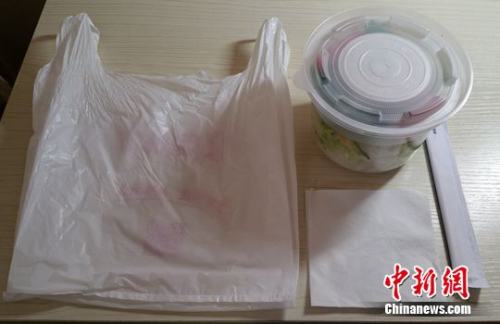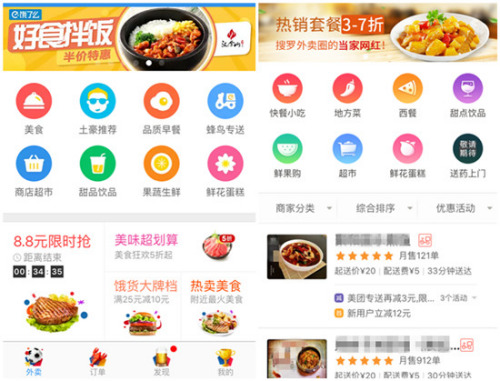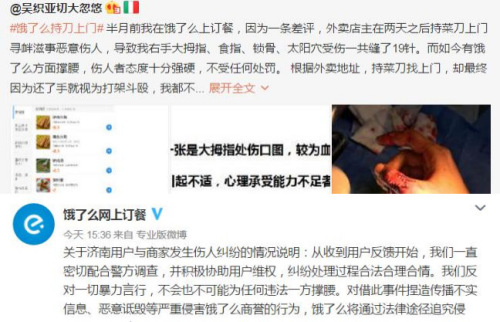Many places have introduced online catering regulations, and takeaways need to indicate the time limit for consumption
China News Service, Beijing, July 14 (Qiu Yu) Beijing, Shanghai and other places have introduced relevant regulations on online catering to strictly prevent the operation of "black workshops". China News Service (WeChat official account: cns2012) reporter investigation found that some third-party platforms did not publicize the merchant’s food business license, and the merchant did not mark the safe consumption time limit on the takeaway packaging according to local regulations.
The consumer.
When defending rights, I don’t know the "ten times compensation" rule
How much should be paid if you eat unclean food when ordering takeout? Many consumers are unaware of this.
Recently, Ms. Xu ordered takeout through a third-party platform for ordering food online, but ended up eating a worm. After complaining, she was only compensated with a 10 yuan voucher from the platform. Ms. Liu also had a similar experience. She ate cockroaches in takeout, and "the merchant proposed 300 yuan for private use." Both told reporters that they did not know the specific legal provisions.
According to the Food Safety Law, if you produce food that does not meet food safety standards or operate food that you know does not meet food safety standards, in addition to claiming compensation for losses, consumers can also demand compensation from the producer or operator for ten times the price or three times the loss; if the amount of increased compensation is less than 1,000 yuan, it is 1,000 yuan.
Zhang Liwen, a lawyer at Beijing Shi Law Firm, said in an interview with reporters that if it costs 70 yuan to order takeout, consumers can ask for an additional compensation of 1,000 yuan instead of 700 yuan, but he also reminded consumers that they should provide sufficient evidence to prove that the food "does not meet food safety standards".
Merchant –
The safe consumption time limit is not marked on the takeaway packaging.

Many places have placed requirements on online catering packaging. Beijing, Sichuan, Fujian and other places require food to be marked with cooking time and safe consumption time limit. But when asked by reporters, several restaurant staff in Beijing said they were "not aware of this regulation" and would not put similar labels on takeaway packaging.
The "Beijing Municipal Measures for the Supervision and Administration of Online Food Business (Interim) " clearly requires that food operators engaged in online ordering services should affix labels to food packaging, indicating the time of food processing and consumption, and reminding consumers to eat as soon as possible to avoid long-term storage.
"This rule is reasonable and should be strictly enforced," Zhang Liwen pointed out. "When you go to a restaurant to eat, it is common sense that the food is newly made. But there is no supervision link when ordering takeout, and merchants should indicate when the food is made and how long it can be eaten."
The reporter noticed that Beijing, Sichuan, and Fujian have relatively strict requirements for online catering packaging, while Shanghai, Zhejiang, and Liaoning have relaxed, "encouraging or recommending" affixing labels to indicate food processing time and consumption time limit.
Platform –
Unannounced merchant food business license

In order to prevent "black workshops", Shanghai, Beijing, Fujian and other places not only require third-party platforms to review the food business license qualifications of online food operators, but also require third-party platforms to publicize information related to food business licenses on their websites.
Beijing stipulates that third-party platform providers shall review and register the qualifications of food operators applying to enter the platform, timely update the operator’s identity certificate, food business license and other qualification certification materials, and publicize relevant information on the main page of their business activities.
Reporters searched and found that the merchant pages of several well-known third-party platforms in Beijing did not publicize relevant qualification information. Although some platforms added a column of "merchant license", some merchants did not upload the license.
"There are some difficulties in the process of verifying the qualifications of merchants," Meituan said. "The base of merchants is large, the verification time is long, and it is difficult to distinguish the authenticity of the qualification documents of some merchants."
The delivery man…
There is a situation of "no health certificate" employment
Shanghai, Beijing and other places require food delivery staff to obtain a health certificate. Meituan and Daojia Food Club both said that delivery staff must undergo a medical examination and obtain a health certificate before they can work. "This is a hard and fast rule."
According to the Daojia Food Club, the company has a special person to register and manage the information of the employee’s health certificate. When the employee’s health certificate expires for one year, it will urge and supervise the employee to update and register.
However, the reporter learned that in order to save costs, some merchants choose to deliver by themselves, sometimes hiring people to deliver food specially, and the compensation is calculated according to the singular number of delivery. Due to the high mobility of food delivery staff, they will not check whether they hold a health certificate, and there are also cases of "unlicensed employment".
Extend –
How to resolve online ordering disputes?

On July 12, Mr. Yue attracted widespread attention by posting a Weibo post online in which he claimed that he had received 19 stitches after ordering food through Ele.me at a store in Jinan called Marriott Donkey Meat Fire, where he was slashed at the door with a knife for giving a bad review.
In an interview with reporters, Mr. Yue said that after the June 26 complaint, for as long as half a month, Ele.me only said that it had upgraded the processing, and did not leave any contact information of the person in charge. "The processing of the merchant was only to close the online payment function for a week, and then continue to operate."
In response, the official Weibo of Ele.me responded on July 13, saying, "We oppose all violent words and deeds, and will not and cannot support any illegal party."
Zhang Liwen believes that third-party platforms have the responsibility to deal with disputes. First, the platform should announce and punish the merchant’s behavior online; second, it should notify other third-party platforms and suggest that they carefully consider cooperating with the merchant, or blacklist the merchant and refuse to cooperate.
He said that if consumers encounter food safety problems and merchants and platforms do not deal with them, considering the high cost of filing a lawsuit to the court, they can choose to go to the industry and commerce, food and drug administration or consumer associations to complain. It is recommended that relevant departments establish a quick handling mechanism to reduce the cost of consumer rights protection and ensure that consumers receive prompt and reasonable compensation.
The Food Safety Law stipulates that the food and drug supervision and management, quality supervision and other departments of the people’s government at or above the county level shall publish the e-mail address or telephone number of the department to accept consultation, complaints and reports. If a consultation, complaint or report is received, it shall be accepted and promptly replied, verified and dealt with within the statutory time limit; if it is not the responsibility of the department, it shall be handed over to the department with the power to deal with it and notify the consultation, complaint and whistleblower in writing.
The staff of the "12331" food and drug complaint hotline told reporters that if consumers can provide the specific location and name of the merchant, they can accept complaints and deal with them. (End)